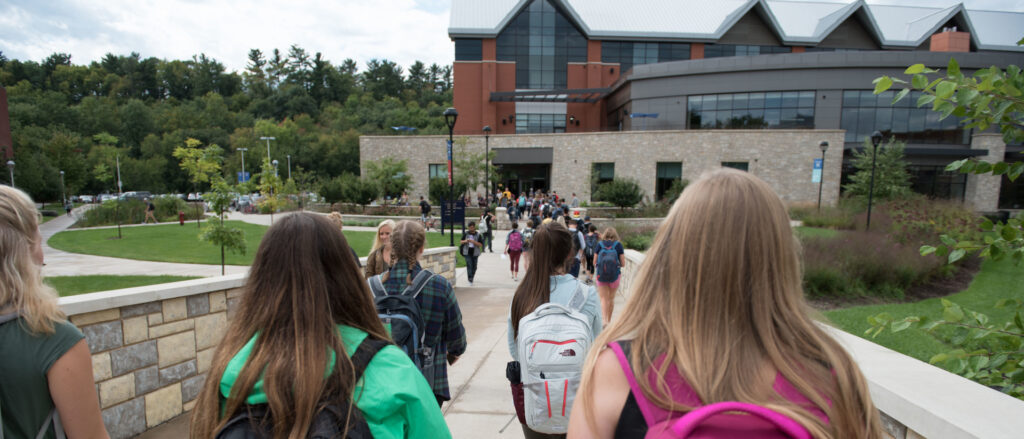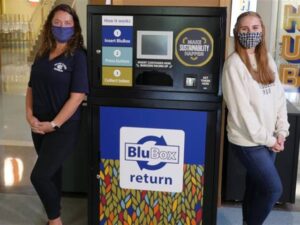

The program that begins Dec. 6 is the first major initiative of the Chancellor’s Advisory Council on Sustainability and Climate Action, according to Grace Crickette, vice chancellor for finance and administration.
“The purpose of the council is to foster collaboration to increase awareness of sustainability concepts throughout the campus community and advocating, communicating and educating to engage students, faculty and staff in these efforts,” Crickette says. “The BluBox Program is a great project that we can launch now to make an immediate impact.”
The blue plastic containers will replace most single-use plastic or cardboard food containers in the dining halls, except for select prepackaged cold items. After use, the containers will be deposited in designated receptacles for sanitization before reuse.
UW-Eau Claire leaders are confident that this nationally successful container program will deliver on a number of key campus sustainability goals, says Brian Drollinger, the university’s director of risk management, safety and sustainability.
“The BluBox program will not only give us the ability to save money and reduce landfill waste, but more importantly, it will raise awareness and education about what we can do as a campus to become more sustainable,” Drollinger says. “Every little bit helps.”
The program, currently in use at UW-Madison and Marquette University, will offer the following environmental and economic benefits:
- Made in the U.S. from Food and Drug Administration-approved and National Science Foundation-certified materials, each BluBox can be sanitized and reused up to 1,000 times, then recycled to create new containers.
- The BluBox production process reduces water consumption by 25% compared to single-use disposables.
- The BluBox production process reduces greenhouse emissions by 19% over single-use disposables.
- Reduces landfill and ocean waste.
- Saves on cost and emissions in the hauling of waste.
- Operation and startup costs recovered within four months of operation.
Kristin Schumacher, director of University Centers, stressed the ease of the user-friendly system.
“It’s three easy steps — fill, eat, exchange,” Schumacher says. “Students, faculty and staff will get their first free token in Davies next to the Service Center, which they will bring to Marketplace or Hilltop and deposit for their container. After eating, the container is simply deposited in one of the BluBox vending machines in Davies or Hilltop in exchange for a new token for the next meal.”
The program brings all of campus together in a singular impactful effort, Schumacher says.
“It makes a strong sustainability statement to everyone in our campus community that says we are ‘all in’ at UWEC — everyone participates,” she says.
For more information, contact Brian Drollinger, the university’s director of risk management, safety and sustainability, at 715-836-4414 or drollibk@uwec.edu, or Kristin Schumacher, director of University Centers, at 715-836-5599 or schumakf@uwec.edu.